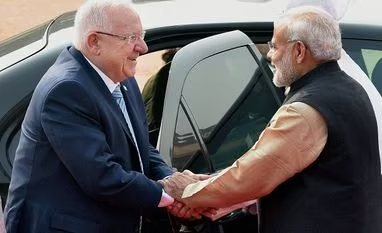Reflecting their growing proximity, India and Israel on Tuesday decided to further "broad-base" their already close defence partnership and intensify cooperation in combating radicalisation and extremism, while calling upon global community to act tough against terror networks and States harbouring them.
The two countries also agreed to deepen their cooperation in a variety of areas including trade and investment, agriculture, water resources and cyber crime during extensive talks between Prime Minister Narendra Modi and Israeli President Reuven Rivlin, who is on his first visit to India.
Giving gist of his talks with the Israeli leader, Modi, in a media statement, said people of both countries were constantly threatened by forces of terrorism and extremism and both sides agreed to intensify cooperation in combating them effectively, particularly having "practical and specific" engagement such as in the cyber domain.
"We recognise that terrorism is a global challenge, knows no boundaries and has extensive links with other forms of organised crime," he said.
In an obvious reference to Pakistan, the Prime Minister said, "Regrettably, one of the countries of its origin and spread is in India's neighbourhood.
"We agreed that the international community must act with resolve and determination against terror networks and States that harbour them. Failure to act and silence of speech only encourages the terrorists," he said.
Noting that Rivlin's visit has given a "crucial push" to efforts to build new pillars in bilateral ties, Modi said both sides noted the strength of the growing defence partnership and agreed on the need to make it "more broad-based" through production and manufacturing partnerships.
India is Israel's largest buyer of military hardware and the latter has been supplying various weapons systems, missiles and unmanned aerial vehicles over the last few years but the transactions have largely remained behind the curtains.
The two sides inked two pacts to strengthen cooperation in agricuture and water resources management sectors.
Referring to growing collaboration between the two countries, particularly in defence sector, Rivlin, the first Israeli President to visit India in two decades, said his country is ready to "make in India and make with India".
He also asserting that nothing can justify terrorism. "We stand together in defending our people and our values," Rivlin said.
The two sides inked two pacts to strengthen cooperation in agriculture and water resources management sectors.
Talking about security cooperation, the Prime Minister
said the two sides agreed to "intensify cooperation to combat the forces of extremism and radicalisation that threaten all peace-loving nations. We also prioritised practical and specific engagement such as in the cyber domain."
He said both sides recognised that terrorism is a global challenge that knows no boundaries and has extensive links with other forms of organised crime.
Referring to Israel's expertise in micro-irrigation in drought-prone areas, the Prime Minister said and water management and conservation, and collaboration in scientific research were identified as areas for priority engagement.
He said both sides agreed that the current trajectory of the Indian economy has opened up many promising opportunities for Israeli companies which can scale up their tie-ups with our India's flagship schemes like Make in India, Digital India, Skill India, and Smart Cities.
"Indian and Israeli companies can also work together in high-technology manufacturing, and services sectors. Make in India and as President Rivlin told me in our discussion, Make with India can generate jobs and benefit both geographies. Our partnership can generate jobs and benefit both geographies," he said.
Modi said India was also grateful to Israel for its "clear support" to India's bid for permanent membership in a reformed UN Security Council.
On people-to-people ties, the Prime Minister said the 2000-year old Jewish community in India represents a thriving link to this past, adding people of the two countries were "biggest strength and the biggest beneficiaries" of the strong Indo-Israel partnership.
"Two-and-a-half decades of our friendship has brought rich dividends for both our nations. It has also strengthened voices of peace, stability and democracy globally. Your visit provides an opportunity to break new ground and shape new contours of our partnership," Modi said.
In his remarks, Rivlin hoped Modi will visit Israel soon.
There were indications that Modi may visit Tel Aviv in first part of 2017 which will be 25th year of formal diplomatic ties between the two countries. India had established "full" diplomatic relationship with Israel in 1992 though it had recognised the country in 1950.
"As we approach this big milestone, we are both committed to advance our engagement on several fronts. And, build on convergences and commonalities in our interests and concerns on regional and global issues," Modi said.
Rivlin, who arrived here yesterday, was given a ceremonial reception at Rashtrapati Bhavan earlier in the day. The Israeli leader also visited Raj Ghat and paid tribute to Mahatma Gandhi.
)